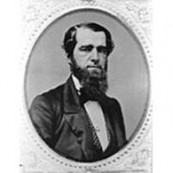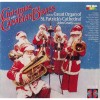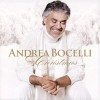传记
James Lord Pierpont (April 25, 1822 - August 5, 1893) was an American songwriter, arranger, organist, and composer, best known for writing and composing "Jingle Bells" in 1857, originally entitled "The One Horse Open Sleigh". He was born in Boston, Massachusetts, and died in Winter Haven, Florida. His composition "Jingle Bells" has become synonymous with the Christmas holiday and is one of the most performed and most recognizable songs in the world.
James Lord Pierpont was born on April 25, 1822 in Boston, Massachusetts. His father, Reverend John Pierpont (1785–1866), was a pastor of the Hollis Street Unitarian Church in Boston. James was the uncle of the financier and banker John Pierpont Morgan.[2] His father Rev. John Pierpont was also an abolitionist and a poet. Robert Fulghum mixed him up with James Pierpont in his book It Was On Fire When I Lay Down On It (1989) and erroneously attributed the authorship of "Jingle Bells" to Rev. John Pierpont. His mother was Mary Sheldon Lord, the daughter of Lynde Lord, Jr. (1762–1813), and Mary Lyman. John and Mary Pierpont had six children.
In 1832, James was sent to a boarding school in New Hampshire. He wrote a letter to his mother about riding in a sleigh through the December snow. In 1836, James ran away to sea aboard a whaling ship called "The Shark".[1][3] He then served in the US Navy until the age of 21.[1]
By 1845, he returned to New England where his father was the pastor of a Unitarian congregation in Troy, New York. James married Millicent Cowee, the daughter of Farwell Cowee and Abigail Merriam, in the late 1840s, and they settled in Medford, where they had three children.[3] His father, Rev. John Pierpont, assumed a position as minister of a Unitarian congregation in Medford, Massachusetts in 1849.
In 1849, James Pierpont left his wife and children with his father in Massachusetts to open a business in San Francisco during the California Gold Rush. He also worked as a photographer. His business failed after his goods burned in a fire.
In 1853, Millicent died, and after James’ brother, the Rev. John Pierpont, Jr. (1819–1879), accepted a post with the Savannah, Georgia, Unitarian congregation, James followed, taking a post as the organist and music director of the church.[3][2] To support himself, he also gave organ and singing lessons. The organ is presently in the possession of Florida State University.
On March 27, 1852, James Pierpont published his composition "The Returned Californian", based on his experiences in San Francisco, published in Boston by E. H. Wade of 197 Washington Street. "The Returned Californian" was originally sung by S. C. Howard, of Ordway's Aeloians, and was written expressly for Ordway's Aeolians "by James Pierpont Esq." and was arranged by John Pond Ordway (1824–1880). The song describes Pierpont's experiences during the California Gold Rush and the failure of his San Francisco business: "Oh! I'm going far away from my Creditors just now, I ain't the tin to pay 'em and they're kicking up a row." The U.S. Library of Congress possesses a copy of the original sheet music for the song. The lyrics to "The Returned Californian" are as follows:
"Oh, I'm going far away from my Creditors just now,
I ain't the tin to pay 'em and they're kicking up a row;
I ain't one of those lucky ones that works for 'Uncle Sam,'
There's no chance for speculation and the mines ain't worth a ('d--') Copper.
There's my tailor vowing vengeance and he swears he'll give me Fitts,
And Sheriff's running after me with pockets full of writs;
And which ever way I turn, I am sure to meet a dun,
So I guess the best thing I can do, is just to cut and run.
Oh! I wish those 'tarnel critters that wrote home about the gold
Were in the place the Scriptures say 'is never very cold;'
For they told about the heaps of dust and lumps so mighty big,
But they never said a single word how hard they were to dig.
So I went up to the mines and I helped to turn a stream,
And got trusted on the strength of that delusive golden dream;
But when we got to digging we found 'twas all a sham,
And we who dam'd the rivers by our creditors were damn'd.
Oh! I'm going far away but I don't know where I'll go,
I oughter travel homeward but they'll laugh at me I know;
For I told 'em when I started I was bound to make a pile,
But if they could only see mine now I rather guess they'd smile.
If of these United States I was the President,
No man that owed another should ever pay a cent;
And he who dunn'd another should be banished far away,
And attention to the pretty girls is all a man should pay."
In 1854, Pierpont composed the songs "Geraldine" and "Ring the Bell, Fanny" for George Kunkle's Nightingale Opera Troupe. He also copyrighted the song "To the Loved Ones at Home" in 1854 and "Poor Elsie", a ballad, written and arranged expressly for Campbell's Minstrels, who were rivals to Christy's Minstrels. In 1855, he composed "The Starlight Serenade", published by Miller and Beacham in Baltimore. Pierpont also composed "I Mourn For My Old Cottage Home". In 1857, Pierpont had another successful hit song composition with a song written in collaboration with lyricist Marshall S. Pike, "The Little White Cottage" or "Gentle Nettie Moore", published by Oliver Ditson and Company, and copyrighted on September 16, 1857. The songwriting credit appeared as: "Poetry by Marshall S. Pike, Esq.", the "Melody by G. S. P.", and "Chorus and Piano Accompaniment by J. S. [sic] Pierpont". Pierpont's name occasionally appeared incorrectly as "J. S. Pierpont".
In 1853, Pierpont had published new compositions in Boston, among them "Kitty Crow", dedicated to W. W. McKim, and "The Colored Coquette", a minstrel song published by Oliver Ditson. "The Coquette" and an arrangement for guitar entitled "The Coquet" were also published that year. Pierpont also published an arrangement entitled "The Universal Medley".
Jamie Keena[who?], a balladeer and authority on 19th century music, who plays the guitar, banjo, fife, hammered dulcimer, and concertina, has recorded several Pierpont compositions from this period. The Pierpont compositions that were performed by Keena included "Ring the Bell, Fanny" (1854), "Quitman Town March", and "Wait, Lady, Wait", as well as three Confederacy songs written in the 1860s, "Our Battle Flag", "We Conquer or Die" (1861), and "Strike for the South" (1863)[citation needed].
Pierpont published several ballads, polkas, such as "The Know Nothing Polka", published by E. H. Wade in 1854, and minstrel songs. Minstrel songs were popular in the 1850s and continued to be popular into the 20th century in the U.S. The lyrics to all minstrel songs reflect and mirror the endemic racism and racial stereotypes inherent in American society and culture. Minstrel songs and the minstrel genre exploited racial stereotypes and racially stereotypical language. The minstrel genre, however, was only a representation of the wider societal racism in the United States.
In August, 1857, James married Eliza Jane Purse, daughter of Savannah's mayor, Thomas Purse.[3] She soon gave birth to the first of their children, Lillie. Pierpont's children by his first marriage remained in Massachusetts with their grandfather.
In August, 1857, his song "The One Horse Open Sleigh" was published by Oliver Ditson and Company of 277 Washington Street in Boston dedicated to John P. Ordway. The song was copyrighted on September 16, 1857. The song was originally performed in a Sunday school concert on Thanksgiving in Savannah, Georgia, although it has been claimed that Pierpoint wrote it in Medford, Massachusetts in 1850.[3][2] In 1859, it was re-released with the title "Jingle Bells, or The One Horse Open Sleigh". The song was not a hit either time. The popularity of the song, however, grew with the passage of time to the point where it became one of the most popular and recognizable songs of the Christmas holiday.
The original lyrics to "The One Horse Open Sleigh" as written by James Lord Pierpont in 1857 are as follows:
"Dashing thro’ the snow,
In a one-horse open sleigh,
O’er the hills we go,
Laughing all the way;
Bells on bob tail ring,
Making spirits bright,
Oh what sport to ride and sing
A sleighing song to night.
Jingle bells, Jingle bells,
Jingle all the way;
Oh! what joy it is to ride
In a one horse open sleigh.
Jingle bells, Jingle bells,
Jingle all the way;
Oh! what joy it is to ride
In a one horse open sleigh.
A day or two ago,
I thought I’d take a ride,
And soon Miss Fannie Bright
Was seated by my side,
The horse was lean and lank;
Misfortune seemed his lot,
He got into a drifted bank,
And we, we got upsot.
A day or two ago,
The story I must tell
I went out on the snow
And on my back I fell;
A gent was riding by
In a one-horse open sleigh,
He laughed as there I sprawling lie,
But quickly drove away.
Now the ground is white
Go it while you’re young,
Take the girls to night
And sing this sleighing song;
Just get a bob tailed bay
Two forty as his speed.
Hitch him to an open sleigh
And crack, you’ll take the lead."
Later arrangements of the song changed the word "joy" to "fun" in the chorus and slightly simplified and streamlined the chorus melody, which was more musically complex in the original. In this slightly modified form, "Jingle Bells" became one of the most popular and most recognizable songs ever written.
In 1859, the Unitarian Church in Savannah had closed because of its abolitionist position, which was unpopular in the South. By 1860, Rev. John Pierpont, Jr. had returned to the North.
James, however, stayed in Savannah with his second wife Eliza Jane, and at the beginning of the Civil War, joined the Lamar Rangers, which became part of the Fifth Georgia Cavalry of the Confederacy.[3][2] Records indicate that he served as a company clerk.[3]
He also wrote music for the Confederacy when it seceded from the Union, including "Our Battle Flag", "Strike for the South" and "We Conquer or Die".[3][2] His father also saw military service as a chaplain with the Union Army stationed in Washington, D.C. and later worked for the U.S. Treasury Department.[3] Pierpont and his father were on opposite sides during the Civil War.[3]
After the war, James moved his family to Valdosta, Georgia,[3] where he taught music. According to Savannah author Margaret DeBolt and researcher Milton J. Rahn, Pierpont's son, Maynard Boardman, was born in Valdosta. The 1870 Lowndes County Census listed: "Pierpont, James 48, Eliza J. 38, Lillie 16, Thomas 8, Josiah 5, and Maynard B. 4." If Lillie is 16 in 1870, she was born in about 1854.
In 1869, Pierpont moved to Quitman, Georgia. There he was the organist in the Presbyterian Church, gave private piano lessons and taught at the Quitman Academy,[3] retiring as the head of the Musical Department.
In 1880, Pierpont's son, Dr. Juriah Pierpont, M.D., renewed the copyright on "Jingle Bells" but he never made much money from it. It took considerable effort to keep his father's name permanently attached to the song after the copyright expired. More information about Dr. Pierpont can be found at Pensacola Medical Heritage on St. John's Historic Cemetery web page.
Pierpoint spent his final days at his son's home in Winter Haven, Florida, where he died on August 5, 1893.[3] At his request, he was buried in Laurel Grove Cemetery in Savannah beside his brother-in-law Thomas who had been killed in the first battle of Bull Run.
James Pierpont's other compositions include:
"The Returned Californian", 1852
"Kitty Crow", Ballad, 1853
"The Coquette, A Comic Song", 1853, with "Words by Miss C. B.". "The Coquet" was an arrangement for guitar by Pierpont of "The Coquette"
"The Colored Coquette", a minstrel song, 1853
"To the Loved Ones at Home", 1854
"Ring the Bell, Fanny", 1854
"Geraldine", 1854
*Poor Elsie", Ballad, 1854
"The Know Nothing Polka", 1854
"The Starlight Serenade", 1855
"To All I Love, 'Good Night'"
"I Mourn For My Old Cottage Home"
"Gentle Nettie Moore" or as "The Little White Cottage", 1857, Marshall S. Pike, lyrics, "Melody by G. S. P.", "Chorus and Piano Accompaniment by J. S. [sic] Pierpont"
"Wait, Lady, Wait"
"Quitman Town March"
"Our Battle Flag"
"We Conquer or Die", 1861
"Strike for the South", 1863
"Oh! Let Me Not Neglected Die!"
Bob Dylan based his song "Nettie Moore" on the Modern Times (2006) album on "Gentle Nettie Moore". The structure of the chorus and the first two lines ("Oh, I miss you Nettie Moore / And my happiness is o'er") of Bob Dylan's "Nettie Moore" are the same as those of "The Little White Cottage, or Gentle Nettie Moore", the ballad published in 1857 in Boston, by Marshall S. Pike (poetry), G.S.P. (melody) and James S. Pierpont (chorus and piano accompaniment).
The Sons of the Pioneers with Roy Rogers recorded "Gentle Nettie Moore" in August, 1934 for Standard Radio in Los Angeles and released it as a 33 RPM radio disc, EE Master 1720. The recording was reissued on the CD #4 of the 5 CD set Songs Of The Prairies - The Standard Transcriptions - Part. 1 - 1934-1935 on Bear Family, BCD 15710 EI, 1998, Germany. The songwriting credit on this collection is listed as: "Gentle Nettie Moore" (Marshall S. Pike/James Pierpont).
James Pierpont is buried at Laurel Grove Cemetery in Savannah, Georgia. He was inducted into the Songwriters Hall of Fame in 1970








